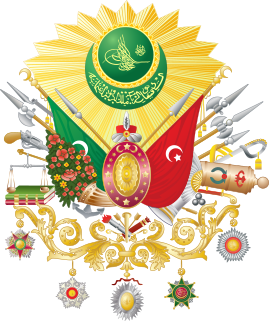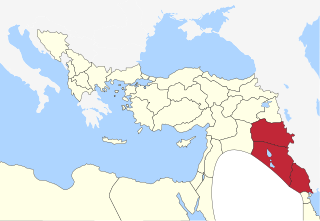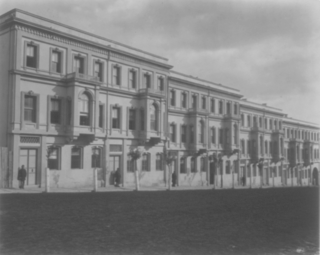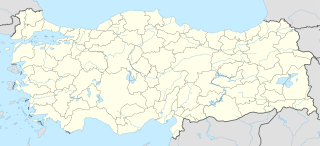Related Research Articles

The dissolution of the Ottoman Empire (1908–1922) began with the Second Constitutional Era with the Young Turk Revolution. It restored the Ottoman constitution of 1876 and brought in multi-party politics with a two stage electoral system under the Ottoman parliament. The constitution offered hope by freeing the empire's citizens to modernize the state's institutions and dissolve inter-communal tensions.
A kaza is an administrative division historically used in the Ottoman Empire and currently used in several of its successor states. The term is from Ottoman Turkish and means "jurisdiction"; it is often translated "district", "sub-district", or "juridical district".

Sheikh Mahmud Barzanji or Mahmud Hafid Zadeh was the leader of a series of Kurdish uprisings against the British Mandate of Iraq. He was sheikh of a Qadiriyah Sufi family of the Barzanji clan from the city of Sulaymaniyah, which is now in Iraqi Kurdistan. He was named King of Kurdistan during several of these uprisings.
Kurds in Turkey refers to people born in or residing in Turkey who are of Kurdish origin. The Kurds are the largest ethnic minority in Turkey. According to various estimates, they compose between 15% and 20% of the population of Turkey. Kurds live throughout Turkey, but are primarily concentrated in Turkish Kurdistan, in the southeast of Turkey.

Armenian–Kurdish relations covers the historical relations between the Kurds and the Armenians.
Kurdish rebellions in Turkey refer to Kurdish nationalist uprisings in Turkey, beginning with the Turkish War of Independence and the consequent transition from the Ottoman Empire into the modern Turkish state and lasting until present with the ongoing Kurdish-Turkish conflict.

The Mamluk dynasty of Iraq was a dynasty which ruled over Iraq in the 18th and early 19th centuries.

Mekteb-i Aşiret-i Humayun or Aşiret Mektebi was an Istanbul school founded in 1892 by Abdulhamid II to promote the integration of tribes into the Ottoman empire through education.

Sheikh Ubeydullah also known as Sayyid Ubeydullah, was the leader of the first modern Kurdish nationalist struggle. Ubeydullah demanded recognition from Ottoman Empire and Qajar dynasty authorities for an independent Kurdish state, or Kurdistan, which he would govern without interference from Ottoman or Qajar authorities. He was a Sayyid, a descendant of Prophet Muhammad. He claimed descent from Shaykh Abdul Qadir Gilani.

Nasiriyah is a city in Iraq. It is situated along the banks of the Euphrates River, about 225 miles (370 km) southeast of Baghdad, near the ruins of the ancient city of Ur. It is the capital of the Dhi Qar Governorate. Its population 2003 was about 560,000, making it the fourth largest city in Iraq. It had a religiously diverse population of Muslims, Mandaeans and Jews in the early 20th century, but today its inhabitants are predominantly Shia Muslims.

The nationalist movement among the Kurdish people first emerged in the late 19th century with an uprising in 1880 led by Sheik Ubeydullah. Many Kurds worked with other opponents of the Ottoman regime within the Committee of Union and Progress (CUP). A growth in ethnic consciousness at the start of the 20th century was spearheaded by the Society for the Elevation of Kurdistan. Some Kurdish nationalist groups agitated for secession, others for autonomy.

The Mosul Question was a territorial dispute in the early 20th century between Turkey and the United Kingdom over the possession of the former Ottoman Mosul Vilayet.
The nahiye or nahia or nahiyah was an administrative territorial entity of the Ottoman Empire, smaller than a kaza. The head was a mütesellim (governor) who was appointed by the Pasha.
The Hamawand are a Kurdish tribe from Northern Iraq. In 1908 they rebelled against the Ottoman Empire. During the Iraqi Civil War (2014–2017), they fought against the Islamic State of Iraq and the Levant alongside other Kurdish tribes.

During World War I, several Kurdish rebellions took place within the Ottoman Empire. These revolts were encouraged by the western allies, particularly Britain, who promised the Kurds an independent state. Nonetheless, the allies provided only limited military support. British promises of an independent Kurdistan were included in the 1920 Treaty of Sèvres, which assigned a small amount of territory for a planned Kurdish state, but these plans were abandoned in 1923 with the Turkish victory in the Turkish War of Independence and the ensuing Treaty of Lausanne.
The Deportations of Kurds by Turkey from 1916 to 1934 refers to the population transfer of hundreds of thousands of Kurds from Turkish Kurdistan that was perpetuated by the Ottoman Empire and its successor Turkey in order to Turkify the region. Most of the Kurds who were deported were forced to leave their autochthonous lands, but the deportations also included the forced sedentarization of Kurdish tribes. Turkish historian İsmail Beşikçi emphasized the influence of fascism on these policies, and Italian historian Giulio Sappeli argued: "The ideals of Kemal Atatürk meant that war against the Kurds was always seen as an historical mission aimed at affirming the superiority of being Turkish." Occurring just after the Armenian Genocide, many Kurds believed that they would share the same fate as the Armenians.

Emin Ali Bedir Khan was a founding member of the Kurd Society for Cooperation and Progress and vice president of the Society for the Elevation of Kurdistan and Kurdish politician.

Abdul-Kadir Ubeydullah President of Kurd Society for Cooperation and Progress and later Society for the Elevation of Kurdistan, was a leading Kurd nationalist intellectual.

Süreyya Bedir Khan was a Kurdish prince, a descendant of Bedir Khan Beg and a member of the Bedir Khan family.
References
- 1 2 3 Jwaideh, Wadie (2006-06-19). The Kurdish National Movement: Its Origins and Development. Syracuse University Press. pp. 108, 109. ISBN 9780815630937.
- ↑ Çetinsaya, Gökhan (2006-09-07). The Ottoman Administration of Iraq, 1890-1908. Routledge. p. 86. ISBN 9781134294954.